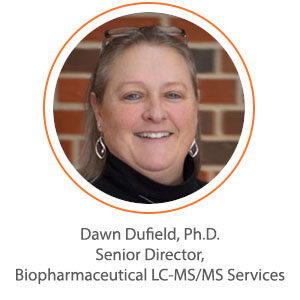 Due to the relative maturity of the technology, most people’s instinct when thinking about bioanalysis of large molecules is towards ligand binding assays. However, we urge people to be open to a more flexible approach. Using hybrid LC-MS/MS can be an equally useful tool for quantitation of biological therapeutics and biomarkers where we combine the principles of ligand binding for extraction, enzymatic digestion and the powerful downstream selectivity of LC-MS/MS. Moreover, flexibility in surrogate peptide selection can be used to provide much more information about different regions of the molecule. This combined with less need for “great” antibodies can help drive the drug development process.
Due to the relative maturity of the technology, most people’s instinct when thinking about bioanalysis of large molecules is towards ligand binding assays. However, we urge people to be open to a more flexible approach. Using hybrid LC-MS/MS can be an equally useful tool for quantitation of biological therapeutics and biomarkers where we combine the principles of ligand binding for extraction, enzymatic digestion and the powerful downstream selectivity of LC-MS/MS. Moreover, flexibility in surrogate peptide selection can be used to provide much more information about different regions of the molecule. This combined with less need for “great” antibodies can help drive the drug development process.
KCAS has built an experienced team who focuses on hybrid LC-MS/MS. As the group has grown, we have seen an evolution in the projects that we’ve worked on and significantly more opportunities where LC-MS/MS provides value to make it the technology of choice.
How has the interaction with clients evolved?
When the group was established, LC-MS/MS was frequently introduced only in the conversation when LBA methods for PK assays didn’t exist, had problems such as background interferences or there was limited availability of reagents.

As we and the field has evolved, we have developed assays that can differentiate a simple alteration in the protein such as a single amino acid switch or a phosphorylation site of interest. LC-MS/MS can focus on peptides of interest where the simple change occurs and measure both species in a single sample.
We now are routinely evaluating both LBA and LC-MS/MS early in a project to establish the “best” solution for our clients. In some cases, we can a priori, determine that LC-MS/MS is the best approach and, in many cases, can be cost competitive.
As our success using hybrid LC-MS/MS continues to grow we see more buy in to the increasing value of LC-MS/MS as a tool for large molecule quantitation and many times new seems to be even considered first.
What are some areas that we think SHOULD consider using Hybrid LC-MS/MS. Recent customers have made the switch.
- Generic Mab PK by Hybrid LC-MS/MS – A good example is how we’ve changed our approach to help early discovery work. Similar to using ligand binding assays for generic Mab detection, we have developed a generic approach for quantitating human mAbs in non-clinical species. This means we have very limited development time as we move between different projects enabling rapid data delivery. We can test a new construct and run a batch of samples many times within 1-2 weeks from start to finish. Generally we focus on Fc peptides but we can add additional more specific regions of the antibody as well and get even more useful data at the same time.
- The additional flexibility in not being tied to a particular binding site for hybrid LC-MS/MS can also be used to give valuable structural information. During a recent LBA study we identified instability in a biological analyte that interfered with the LBA assay quantitation. Pivoting to hybrid LC-MS/MS, we identified unique peptides at the N-terminus, C-terminus and the center of the molecule. Monitoring those peptides over time we were able to identify the specific region of the molecule that was associated with instability. Furthermore, we were able to confirm that the activity of the therapeutic was not affected by instability in that region.
What are the biggest challenges and our strategy for addressing them?
It’s almost guaranteed during calls that when we ask how sensitive an assay is needed the response is for as low an LLOQ as possible. With that in mind., KCAS has recently invested in two SCIEX 7500 triple quadrupole mass spectrometers. In our hands we are regularly seeing a 2 to 4x gain in signal:noise compared to the SCIEX 6500 for the same assays. Changing to a new platform buys us sensitivity without increasing the complexity of the assay if we were to go more with microflow or nanoflow scale chromatography. Limited commercial options for complex multidimensional nanoscale work are also a barrier but we are working directly with the equipment manufacturers on that.
Evolution of the Hybrid LC-MS/MS team
The large molecule projects we see are increasingly complex as many times hybrid LC-MS/MS is chosen only when other technologies or labs have failed. Although KCAS currently considers the bioanalysis of large molecules using LC-MS/MS to be relatively routine, it is still a scientifically complex process requiring specialized skills. Our depth and breadth of knowledge and experience allows us to quickly pivot between experiment approaches within the Hybrid space when assay issues arise. Understanding various ways to navigate around a potential problem during the IP and/or digestion plays a critical role more so than just the typical chromatographic separation or the performance of the mass spectrometer. For a hybrid LC-MS/MS team to be successful, the ability to really understand and manipulate what is happening during the capture and enrichment level as well as experience with the frequently complex technology is essential.
If you’d like to hear more about our Hybrid capabilities, please contact KCAS using the form below.

